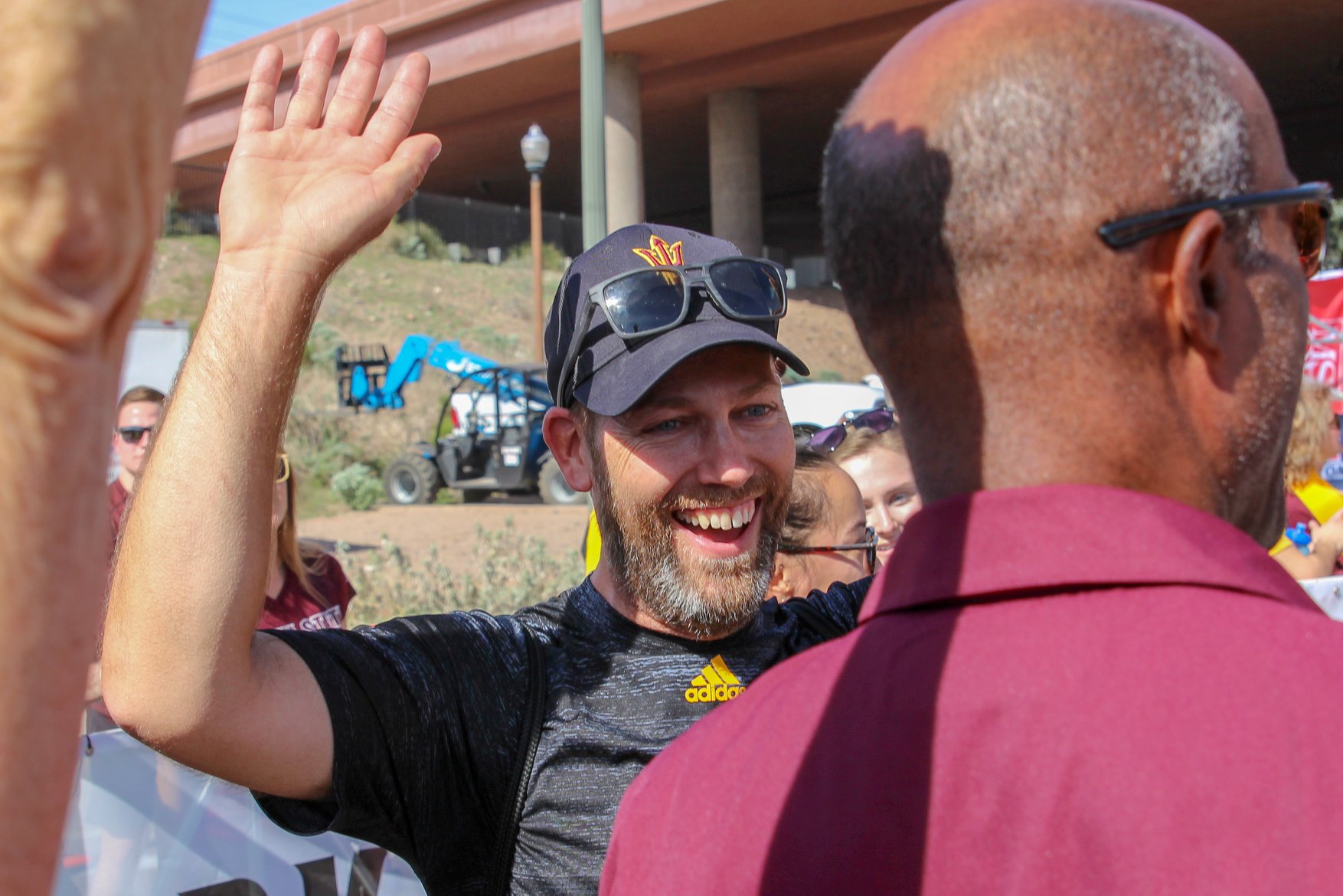
(Photo: Nicholas Badders/WCSN)
When Arizona State triathlon head coach Cliff English sits down with prospective recruits, English’s experience working with Olympic triathletes weaves its way into the conversation.
The endgame for most triathletes is to make the summer Olympic Games at some point in their careers, and there is perhaps no coach at the collegiate level better equipped than the two-time reigning NCAA triathlon Coach of the Year to help them get there. His record of success training triathletes speaks for itself.
English has developed successful triathletes such as Samantha McGlone, Sarah Haskins, Ashleigh Gentle, Tim O’ Donnell, Heather Jackson, Liz Lyles, Asa Lundstrom, Josh Amberger and TJ Tollkason to the top of their game, enabling them to collect major podiums and wins with several Olympic appearances and world titles to boot. His career has taken him to the Pan-American Games, World Championships, Xterra, 70.3, Ironman and four summer Olympic Games. He was also the coach for Peter Reid’s final podium in Kona in 2005 and Hunter Kemper’s last Olympic appearance at the London Games in 2012.
When English stepped foot on the Tempe campus as the inaugural triathlon coach in October of 2015, he immediately became the most accomplished triathlon coach to join the collegiate ranks, giving notoriety to a sport that was in its earliest stages at the NCAA level.
Despite English’s success training Olympians and professional triathletes, there were still some new tricks the veteran coach had to adjust to. The most difficult among them, English admitted, was recruiting.
“That’s the biggest thing, to be honest, I don’t come from this background,” English said. “I actually had never recruited before in my life, I had gotten to the point where I was very fortunate to have had a successful career where people would seek me out. I never had to do much advertising, I just had results.”
That style of recruiting, based off letting results speak for themselves, hasn’t been abandoned by English. With three consecutive NCAA titles, the shine coming off of the trophies and medals are practically screaming at future collegiate triathletes to factor English’s program at Arizona State in their decision. At just four years old, the triathlon program at ASU is still in its relative infancy, but English knows he already has a team stocked full of athletes that possess the qualities of Olympic athletes — with more on the way.
“When you build something special you want to be a part of it, a lot of the kids we get are incredibly talented, a lot of drive, a lot of ability, someone that wants to be in the sport for a long time, someone that wants to represent their country,” English said. “We’re getting a lot of these kids that want to do the same.”
Mastering triathlon is one of the most physically demanding sports at the Olympic Games and takes an immense amount of training and development. Though it is a tall task for recruits, English is impressed with how well his team has performed in competition against professional triathletes who train up to twice as much as student-athletes per week.
Hannah Henry, who has won two NCAA individual titles in two attempts, was able to capture a silver medal at the Pan-American Games in July as part of a mixed relay for the Canadian National Team. Charlotte Ahrens, from Nuremberg, Germany, competes for her country’s national team and scored second place among women at the 9/11 Heroes Run in Tempe last fall. The Devils also had three triathletes, Kira Stanley, Liberty Ricca, and Olivia Jenks, place in the top-20 at Junior Nationals in August.
While the members of the team are teammates at the NCAA level, they will compete against each other as rivals on an international stage in the not-so-distant future. Four members of the team are not originally from the United States. Outside of Nuremberg’s Ahrens, Henry is from Victoria, Canada, junior Kylie Roy is from Winnipeg, Canada, and freshmen Gal Rubanenko hails from Tel Aviv, Israel.
Coaching a sport like triathlon, where the sum of individual results counts toward an effective team win, presents unique challenges. English navigates those waters by spending as much one-on-one time with his triathletes as he can. Those meetings come before every race and after every race with each athlete on his team, where English will focus on how he can best help his triathletes achieve their goals. The personalized training style he creates from those meetings is something he attributes to his success as a coach.
“I just try to be really clear about the outline I see for them,” English said. “I always try to have my meetings where they feel their voice is heard and from there I’m like, ‘hey, this is where I see you and this is how I feel I can get you there and what we need to do.’ That’s very important.”
Because of all the work English has done to turn Arizona State into one of the first NCAA triathlon dynasties, this will be the first summer Olympic Games where he is not heavily involved in either coaching or training athletes.
The U.S. Olympic Triathlon Team still values the distinguished coach’s opinion and has consulted him on numerous topics such as team makeup and training regimen.
Back in the bright afternoon sun in Tempe, English is preparing his team for its second competition of the season. The athletes that comprise this elite collegiate team have records that speak for themselves, and English knows he is training many future Olympians. For English, what distinguishes his program from the pack is the Olympic mindset of his superstar athletes.
“I would say if you’ve got a good attitude, there is no limit to what you can do here,” English said. “If you want to be here, and you want to work with the coaching staff, then it’s going to be a great partnership.”


